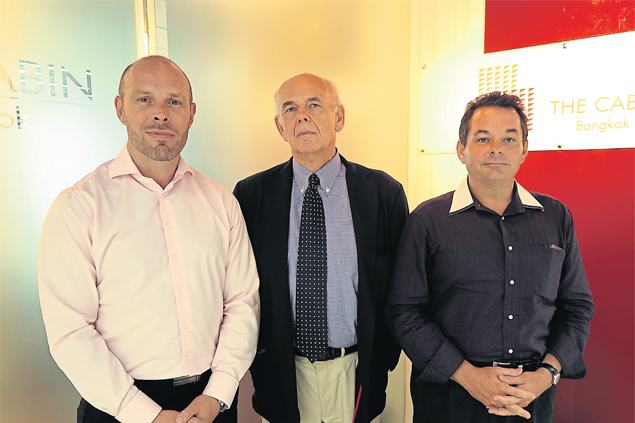Since 2010, The Cabin -- a rehabilitation centre for people with addictions -- has opened its doors in the Northern province of Chiang Mai to patients, especially foreigners, to come for in-patient treatment.
And just last month, the rehab centre opened its second branch in Bangkok to cater for those who want to break free from addiction and regain control over their lives.
Behind the rehab centre are three experts in addiction treatment: Alastair Mordey, programme director of The Cabin Bangkok; Dr Craig Gagnon, head counsellor of The Cabin Bangkok; and Dr Brian Wells, The Cabin's medical director.
Mordey, a certified and accredited addiction counsellor from the UK, cofounded The Cabin Chiang Mai five years ago, the same year his therapy model involving cardiovascular sports became Britain's national model for health in long-term addiction recovery.
"We've noticed that there are a lot of expats who work in finance in Thailand, Hong Kong or Singapore who may be CEOs or just people who work in the financial industry that simply drink too much," said Mordey.
"Now, these kinds of guys, they're not going to want to fly all the way back to America or the UK. In fact, they may not be able to; they might have a job to do here. So it's very useful to have something regional, so that they can fly here to get treatment then fly back to work."
The Cabin Bangkok is different from the centre in Chiang Mai in that it offers outpatient counselling for those suffering from any kind of addiction, be it chemical addictions like drugs and alcohol, as well as process additions such as sex and gambling. The therapeutic model used in The Cabin Chiang Mai is certified by the Thanyalak Institute on Drug Abuse Treatment, Department of Medical Services.
Mordey, who now works closely with the Office of Narcotics Control Board (ONCB) in Bangkok, added that people's perspectives towards alcoholism are paramount in treating patients. When most Thai people think about an alcoholic, they think of some guy on the streets with no clothes and begging. The truth is actually not always like that.
"Most alcoholics aren't really like that," said Mordey. "They're normal people with jobs. Addiction is an illness, one that can affect anyone from the poorest person to the richest. [Recent studies have shown] that there is a big genetic component to alcoholism or drug abuse. You can be born with an illness that makes it more likely for you to become addicted in the future."
Mordey's claims of addiction being a genetically inherited condition -- a claim supported by studies from international health institutes such as America's National Institute on Drug Abuse (NIDA) -- extends to his mantra in treating patients of addiction: It's not your fault for having an addiction, but it's your responsibility to get it treated.
"For many countries in mainland Asia and also in the Middle East, the treatment of mental disabilities is still very heavily stigmatised. Talking about your problems isn't exactly what you want to do when you live in an Asian country as it isn't exactly encouraged like it is in the West, where we are so awfully open all the time in a way that would be unpleasant for a Japanese, Chinese or Emirati to be. They don't want to open up about their problems to strangers because they think it is shameful."
Dr Gagnon, addiction and mental health counsellor, added that some clients even cite religious reasons for resisting treatment. With his experience teaching psychology and counselling in universities both in the US and in Thailand, he shared his experiences treating a Thai client who felt like his battle with addiction was some form of karmic repentance.

The group counselling room at The Cabin Bangkok.
"I've had clients who told me that they believed that they were supposed to be addicted for something they did in their past life, and that by getting treatment, they would be cheating their karma and thus have to go through it again in the next life. My usual response is how do you know it's not karma that you have to go to treatment?"
The Cabin's Medical Director Dr Wells, who has 30 years of clinical and managerial experience in all aspects of addiction treatment, presented a different perspective on the role of spirituality in addiction counselling.
"Sometimes, [Asian patients handle recovery] really, really well. Once they get into recovery, there's often a kind of meditation or spiritual component, and it really helps when one has grown up in a culture with such spirituality. As such, people from Thailand who I've seen in treatment in other countries tend to do very well."
Despite the social and cultural factors working against addiction therapy, however, Thailand is starting to show a positive movement towards accepting and helping those currently suffering from addiction. According to Dr Gagnon, more and more support groups for recovering addicts have been established all over Thailand in the past several years.
"In Thailand, the openness to Western treatment of addiction -- just in the time I've been in Thailand in the last six years -- [has] increased. A lot of our clients who undergo clinical treatment go on to join support groups like Alcoholics Anonymous or Narcotics Anonymous, so they can have empathy and see other people that are recovering from addiction," he said.
"Just in the last three or four years, the number of Thai language support groups from Chiang Mai to Hat Yai have increased. Five years ago there may have been one Thai language 12-step [support] group in the country, but now I know of about eight of them.
"And some of these are young men from the working class whose choices before were a mental hospital or prison, but have been clean of drugs and alcohol for two or three years. Recovery from addiction is no longer just for the privileged any more."

